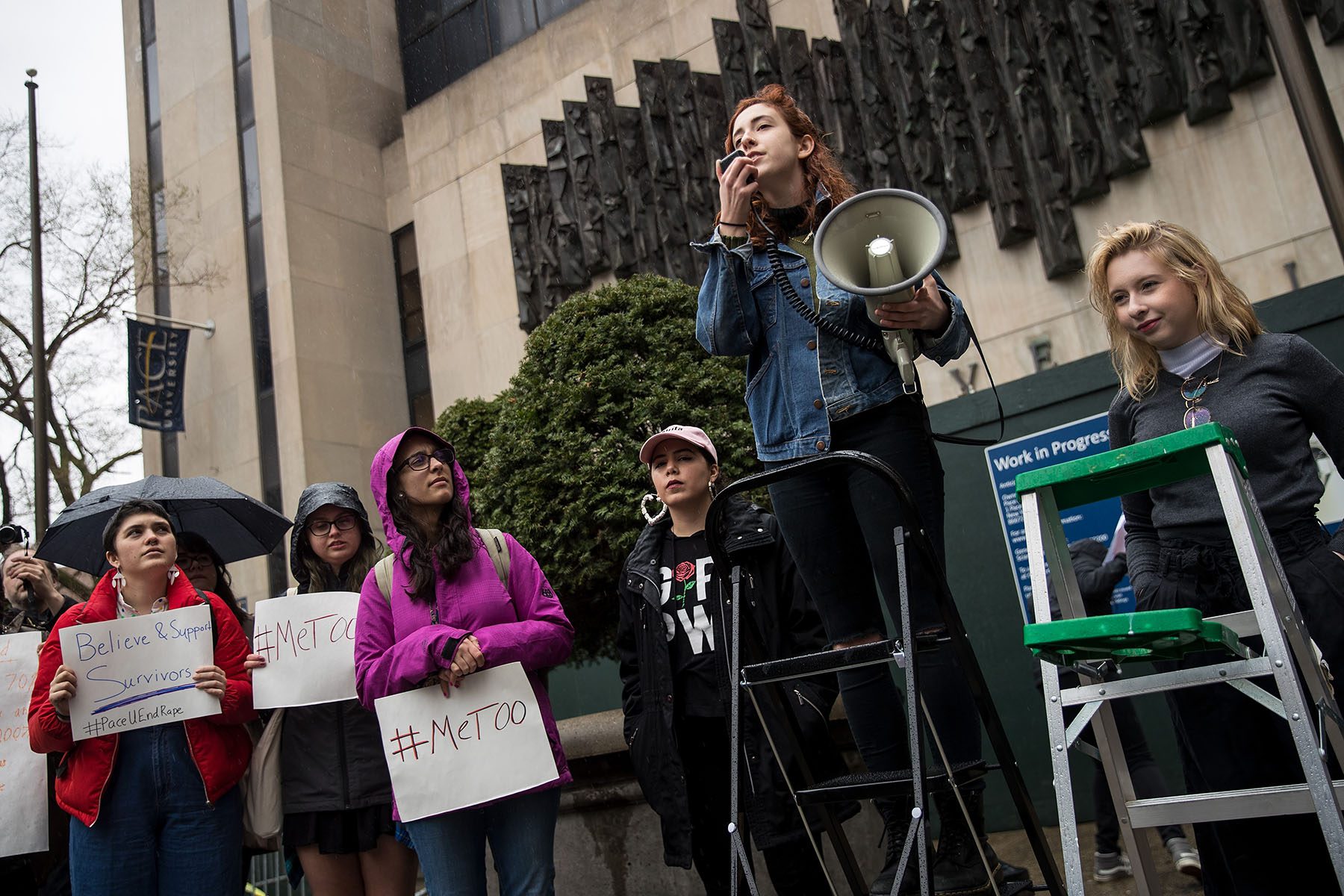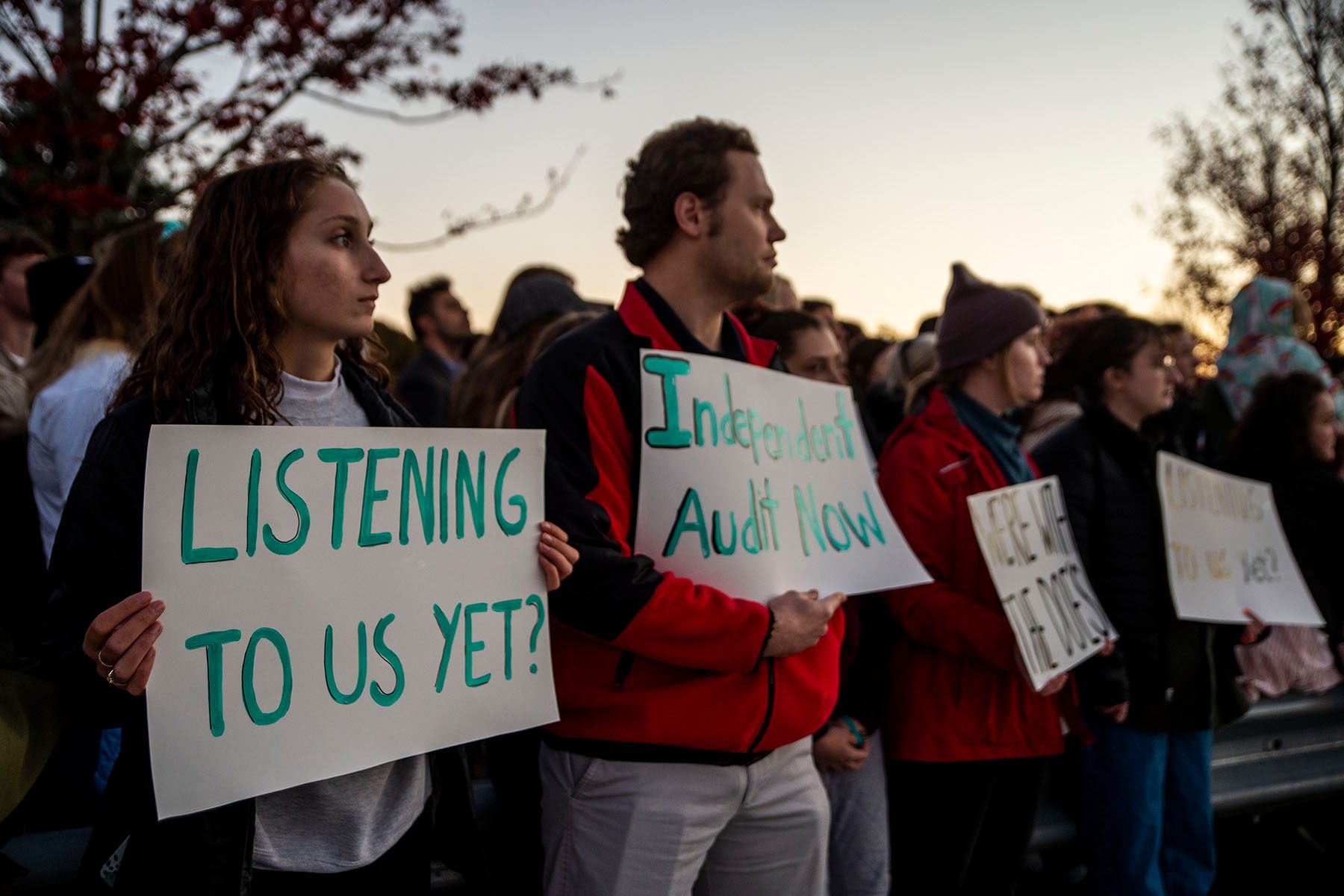The Biden administration is expected this month to revise guidelines for how schools, particularly colleges and universities, address sexual misconduct under Title IX.
The White House, and Education Secretary Miguel Cardona, have faced pressure to reverse changes made by the Trump administration under Cardona’s predecessor, Betsy DeVos. Title IX is a federal law that bars schools from engaging in sex-based discrimination, but each administration interprets the statute differently.
“We’re really hoping that, under the current administration, we’ll see a Title IX rule that puts students and survivors first and that really centers their rights and protections,” said Kenyora Parham, executive director of End Rape On Campus.
Advocates for victims of sexual assault and harassment had criticized DeVos’ guidelines for limiting the meaning of sexual harassment, protecting accused offenders and making it harder for students to report sexual misconduct. DeVos argued that Title IX protected alleged assailants and victims alike.
In contrast, the Obama administration’s guidelines were designed to hold schools accountable for failing to address sexual violence, said Laura Dunn, founding partner of L.L. Dunn Law Firm in Washington, D.C. She has represented student survivors of sexual misconduct who accused their schools of sex discrimination. Dunn disagreed with DeVos’ assessment that Title IX protects students accused of wrongdoing.
“No, it doesn’t,” Dunn said. “It never has. It never will.”
With a new administration in office, advocates for student survivors of sexual misconduct expect the DeVos regulations to get an overhaul. Cardona can make the regulations more survivor-friendly by removing many of the protections that DeVos gave to alleged assailants, requiring schools to investigate claims in a reasonable timeframe and shielding students from retaliation, among other measures, they said. They would also like Cardona to keep the couple of DeVos guidelines they felt benefited survivors.
Here are some key ways the administration could change the guidelines:
How sexual harassment is defined
The Education Department had long defined sexual harassment as unwelcome conduct of a sexual nature, but the DeVos regulations directed schools to dismiss sexual harassment complaints save for the most egregious cases.
Under DeVos, the Education Department pulled its definition of sexual harassment from civil court standards, Dunn said. Since civil courts lack the time and resources to hear all cases, the system intentionally defined sexual harassment in terms that rise to the level of litigation. But schools can go above and beyond civil court standards.
When DeVos announced her rules, she said that too many schools had inadequate responses to sexual misconduct claims and that her guidelines would make the process fair and transparent. Trump officials also said that their rules would result in schools protecting the rights of all students.
Who’s eligible to file complaints
The DeVos guidelines limit the pool of people eligible to file sexual misconduct complaints. Students may not lodge complaints after they leave an educational institution, even if the accused person still attends the school. Survivors must be continuing or seeking ongoing access to education at an institution to file a sexual misconduct complaint.
“If you are finishing your Ph.D., and you’re being harassed by your faculty adviser and you want to wait to get the degree done and the dissertation approved before you file that complaint to save your own career, Title IX would dismiss it right now, and that was never true before,” Dunn said.
This change is especially concerning because Title IX was enacted to protect everyone in an educational environment from sex discrimination, Dunn said. Students who witness sexual misconduct may feel as unsafe at school as the victims directly affected, especially if the offender managed to harm others with impunity. As long as an offender remains on campus victimizing and intimidating classmates, Dunn added, the educational environment is inequitable.
How survivors are treated
Title IX used to direct schools to include “equitable interim measures” for survivors, but that changed to “supportive measures” during the Trump era. It’s a significant shift in language, advocates say.
“Equity is meeting people at the differential points to get them to the same place,” Dunn said. “If you are a female student being sexually harassed by a male student, only you as the female student are being victimized. The male is not. He’s the perpetrator, so you give the interim measures only to the female victim.”
The Trump-era Title IX guidelines also instructed schools to provide supportive measures to both students. This led to schools issuing mutual no-contact orders against alleged victims and perpetrators alike. Dunn considers such orders to be a form of retaliation that limit a survivor’s access to education.
Under the old guidelines, for example, if the victim and the alleged offender both used the same science lab, the latter would be moved to a different class. Under the DeVos guidelines, whoever arrives at a place first gets to stay and the other party must leave. That may lead accused students to show up early to campus locations where they know their accusers planned to be simply to intimidate them.
Alexandra Brodsky, a civil rights attorney and author of “Sexual Justice: Supporting Victims, Ensuring Due Process, and Resisting the Conservative Backlash,” said that sometimes schools do treat students accused of breaking the rules unfairly, whether they’ve allegedly committed sexual misconduct or another type of offense. But, she added, changing how schools respond to sexual assault alone is not the right move. She particularly objects to the DeVos regulation requiring schools to hold live hearings with cross-examinations of both accused students and their accusers during misconduct probes.
“It’s a really uniquely onerous and adversarial and retraumatizing process that looks a lot more like a criminal trial than like student discipline, than like faculty discipline,” Brodsky said.
Using cross-examinations during these probes not only harms survivors but also privileges alleged offenders who have affluent parents capable of hiring lawyers for them.
“Too often, when one side can afford a lawyer and the other can’t, it’s the person who can afford the lawyer to ultimately prevail,” Brodsky said.

The use of written complaints
The DeVos guidelines formalize the complaint-filing process by requiring victims to sign written statements about the misconduct they endured.
Requiring complainants to sign statements about the sexual misconduct they experienced may deter victims from coming forward and single them out. At a K-12 school in Texas, multiple girls told administrators that the same person had harassed and assaulted them, Dunn said, but only one girl was willing to sign a document to that effect.
“So, even though the school knows this guy is a serial perpetrator, they only act as if he’s committed potentially one offense and only investigate one offense and ignore all the other evidence because people didn’t sign the document,” Dunn said.
When accused students are notified
Under the DeVos regulations, when schools receive a complaint about a person, they must notify the individual immediately. This has led to accused students writing statements in their defense with an attorney’s help well before schools formally investigate their conduct.
Rather than tipping off accused students, advocates say, schools should gather as much evidence as they can about a misconduct complaint and notify the accused when they’re ready to bring charges. While schools need to notify accused students about complaints before these individuals meet with officials about the allegations, they do not need more notice than that, Dunn said.
How long investigations take
DeVos added time requirements to the Title IX regulations that advocates say are unnecessary for an educational setting because schools generally have the time and resources to wrap up a sexual assault investigation in a timely manner, unlike the nation’s overburdened courts. Once a school has gathered all the evidence related to a sexual misconduct case, it is required to give both parties at least 10 days to review the information with their advisers and respond. Then the school has to write a draft report and give parties 10 more days to review and respond to that. The same timeframe applies to the school’s final report.
Combined with the time it takes school officials to gather evidence, which can go on for months, cases start to drag.
“What we increasingly see is students who are part of school investigations that go on for over a year,” Brodsky said. “The DeVos regulations really just took the pressure off schools to resolve these complaints in a reasonable timeframe.”
Instead of listing time requirements for schools, the regulations could simply give administrators a “reasonable” time to complete their investigations, advocates say. If a school has the resources and evidence to wrap up an investigation in three months, that would be reasonable, while taking an entire school year or longer would not be.
How prevention and retaliation are handled
Title IX guidelines should not only take claims of sexual assault seriously but also work to prevent these incidents from happening, advocates say. That’s why Parham of End Rape on Campus wants the new regulations to clarify which campus officials are legally responsible for coordinating prevention education programs.
“What we do know is that the current DeVos Title IX rule says very little about the importance of prevention education,” Parham said.
Additionally, Parham wants the new guidelines to protect students who file sexual misconduct complaints from retaliation. She has advocated for students who’ve accused professors of misconduct, only to have their grades unfairly lowered and their academic scholarships placed in jeopardy.
How LGBTQ+ students are included
Advocates anticipate that Cardona will codify protections for LGBTQ+ students in his new Title IX guidelines. In a preliminary version of his Title IX plan, Cardona stated that sex discrimination includes “discrimination on the basis of sex stereotypes, sex-related characteristics (including intersex traits), pregnancy or related conditions, sexual orientation and gender identity.”
He has also stated that the Supreme Court “has upheld the right for LGBTQ+ people to live and work without fear of harassment, exclusion and discrimination — and our LGBTQ+ students have the same rights.”
The Supreme Court ruled in the 2019 case Bostock v. Clayton County that Title VII, which prohibits sex discrimination in workplaces, also bars anti-LGBTQ+ discrimination.
Now, “the Biden administration is putting in place these binding regulations that will make it much harder for the next Republican administration to undo those protections,” Brodsky said.
What advocates hope stays
Although Dunn has numerous concerns about the DeVos regulations, she said that some may help survivors. For one, they state that teachers are “responsible employees,” which makes them liable for Title IX violations and requires that they intervene in cases of peer-to-peer sexual violence in K-12 schools. Although sexual misconduct is nearly as common in high school as it is in college, Dunn said, these schools have not been the focus of Title IX regulations concerning sexual violence.
She also applauds the Trump administration for requiring schools to keep records of sexual misconduct complaints and to do so for a set period of time. She said previous administrations failed to require record-keeping.
Although the Trump administration directed schools to keep records related to misconduct, Dunn said that neither its Title IX guidelines nor those of previous administrations required schools to hand over these records to students. Dunn said she’s filed lawsuits simply to help students obtain these records.
While advocates have high hopes for Title IX under the Biden administration, they will keep fighting for students to enjoy a discrimination-free education no matter which party is in office.
“My hope is that the new regulations will also address other forms of discrimination,” Brodsky said. “All of these different pieces of Title IX’s reach around harassment, around athletics, around pregnancy, around dress codes, work together to ensure equal access to education.”









